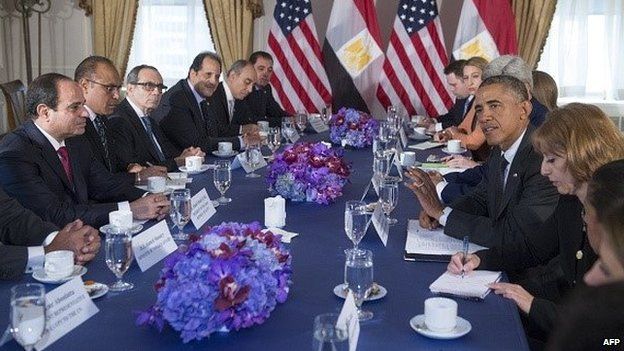Business as usual for Egypt and the West
- Published

The renewal of US arms shipments to Egypt has come in spite of the fact some observers say the country is worse under President Abdul Fattah al-Sisi than it was under its former leader Hosni Mubarak, who lost the support of the Americans during the 2011 popular uprising.
The United States has given significant military and economic assistance to Egypt during the past four decades.
The country has been seen as a key factor in regional stability.
One estimate has it that the US has provided Egypt with $76bn (£50bn) in foreign aid between 1948 and 2015.
This includes $1.3bn a year in military aid from 1987 to the present.
This pattern of support was temporarily halted after President Sisi overthrew the democratically elected leader, Mohammed Morsi, in 2013.
In October of that year, the US administration announced it would withhold the delivery of military equipment - F16s, Apache helicopters, Harpoon missiles and tanks, subject to credible progress towards democracy.
There was a change in posture last year, when Apache helicopters were sanctioned for delivery to Egypt to help the country's counter-terrorism operations in Sinai.
And a few weeks ago, US President Barack Obama announced 12 F16s, 20 Harpoon missiles and up to 125 M-1 Abrams tank upgrades were earmarked for delivery to the Egyptians in the interests of national security.
At the same time, Mr Obama reiterated ongoing US concerns about "Egypt's continued imprisonment of non-violent activists and mass trials".
America is not alone though in returning to business as usual.
France has this year negotiated a $5bn arms deal with Egypt, involving the sale of fighter jets and a naval frigate.
Last year, France sold Egypt four naval frigates in a deal estimated to be worth $1.3bn.
In September last year, Russia announced it had reached a $3.5bn arms deal with Egypt.
No precise details were given, but the agreement forms part of a picture of improving Russian-Egyptian relations, with increased economic and military cooperation.
In February of this year, Russian President Vladimir Putin visited Egypt and promised help in constructing a nuclear power plant.
Egypt also receives considerable financial support from Gulf Cooperation Council countries - at least $20bn in the past year and a half, according to some reports.
A conference last month led to billions of dollars in investment commitments.
Saudi Arabia, the United Arab Emirates, Kuwait and Oman pledged more than $12bn.
In some ways, none of this should be surprising.
Egypt has always been an important country in the Middle East, seen by some as a powerful and balancing voice in the Arab world.
Its position in the region, is seen as critical to wider peace between Arab states and Israel.
It controls the Suez Canal, through which almost a 10th of all global shipping passes every year.
It is by far the largest Arab nation, with a population of 83 million expected to exceed 100 million by 2030.
Half the population is under 25.
The country is home to the Arab League and is a leading light in Islamic scholarship.
Yet it has also been a battleground between moderate and radical Islam.
And the role of Egyptian extremists in al-Qaeda and other such movements is significant and considerable.
Mohammed Atta, the ringleader of the 9/11 attacks on the US, was Egyptian, as is Ayman al-Zawahiri, the leader of al-Qaeda.
And last but not least, Egypt forms, with Saudi Arabia, an axis of Sunni Muslim political power in the Middle East.
Egypt has been crucial in America's calculations in the Middle East.
But some commentators say it is not as important now as it once was and that countries such as Jordan and the UAE are more significant US allies now.
Indeed, Egypt's closeness to America is not that long established.
During the 1950s and 1960s, America was suspicious of Egypt - US views were coloured by the Cold War, Arab nationalism, and the more important strategic relationship with Israel.
The Americans were suspicious too of the Egyptian leader, Gamal Abdel Nasser.
As a result, Egypt turned to the Soviet Union for friendship and military support.
When Nasser died in 1970, the new Egyptian leader, Anwar Sadat, worked to move Egypt closer to the US, culminating in the signing of the Camp David accords in 1978 and the eventual 1979 peace treaty with Israel.
This closeness continued under Hosni Mubarak, who was seen until the very end as a useful ally.
Realpolitik, say some, suggests a new US accommodation with Egypt in a bid to restore stability in a war-torn region.
This realpolitik though is precisely what irks critics of President Sisi.
The country's jails are overflowing.
The Muslim Brotherhood is once again outlawed.
Its political party, the Freedom and Justice Party, has been dissolved by court order.
The Egyptian authorities have declared the Brotherhood itself a terrorist organisation.
Many of its leaders are in jail.
Mohammed Morsi, the elected Islamist leader, overthrown by the army two years ago, has just been given a 20-year jail sentence for ordering the arrests and torture of protesters demonstrating against his rule.
Not many Egyptians shed tears over the fate of the Brotherhood.
It did not have overwhelming public support, and many Egyptians saw it as abusing a weak electoral mandate during its short time running the country.
But it was nevertheless a democratically elected government, one that was removed by force.
And now it is not just the Muslim Brotherhood that finds itself under siege.
The press is rigidly policed, and many organisations at the heart of civil society are no longer functioning.
These conditions in many ways mirror those that led directly to the uprisings known as the Arab Spring, and it is this that worries those hoping for progress and peace in Egypt and the wider region.
- Published2 January